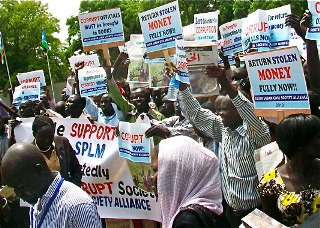South Sudan government denies killing leading civil society member
September 9, 2016 (JUBA) – South Sudan’s government has denied responsibility for killing of a civil society activist on Thursday.

The group of activists representing civil society organizations in South Sudan supported deployment of regional troops in Juba and establishment of a hybrid court to try leaders implicated in the war crimes and crimes against humanity from 15 December 2013 when war broke out in the world’s youngest nation.
A senior government officials loyal to President Salva Kiir said they had no idea how the activist was killed.
“I am not aware. From where did you hear it,” asked Tut Kew Gatluak, presidential advisor on security affairs, when contacted by Sudan Tribune on Friday.
Also circumstances behind the death of the activist remain largely speculative and nobody among his family members has publicly come out to claim it. Government officials were denying any knowledge of his death as well as participation of a person called Emmanuel Wani during the meeting with the UN Security Council members.
Leading members of the civil society organizations told Sudan Tribune on Friday that they were divided into two separate groups after the arrival of the UN Security Council delegation to Juba last Friday for consultation with the government and other stakeholders.
“I know how our meeting with the Security Council delegation was arranged. Because there [were] two views, the delegation of the United Nations Security Council decided to meet separately with two groups of South Sudan Civil Organizations. The delegation met the South Sudan Civil Society Alliance together with the youth group, women group, Juba University students Union and representative of Chiefs who were supportive of the views of the government. The members of the Security Council later met our group, who are actually the active and independent members of the civil society and other activists, most of us are those in the field and advocate for peace as the only viable way to end the conflict in this country,” a leading member of the civil society organizations recalled.
“So for us we feel it would [be] wise to demilitarize Juba and expedite deployment of the protection [force] and begin the process of institutional reform and implement transitional justice mechanisms among others,” he said.
The activist however said he did not see Emmanuel Wani at the meeting but heard that he was shot dead on Thursday in Juba at around 1:15 pm by gunmen in military uniform.
“There are two Emmanuel Wani I know but which one is being talked about? There is Emmanuel Laku Wani and Emmanuel Subek Samuel Wani, both of them are activists but they were not in the meeting,” he clarified.
He confirmed that other civil society members who met the Security Council members have left the country for fear of their lives. The activists cited government intimidation in retaliation for meeting with the visiting UN Security Council last week as the reasons for fleeing the country.
These reports, if confirmed, are the latest sign of hostility by the government toward the international community as the East Africa’s youngest country tries to recover from a civil war that threatens regional peace.
At least three local organizations have been told by South Sudan’ government that they can no longer operate. On Wednesday, the U.S. envoy to South Sudan, Donald Booth, told Congress that the number of blacklisted groups could be as high as 40.
South Sudanese government accepted the deployment of 4,000 strong regional force during their interaction of the UN Security Council’s delegation.
However, the government a day later came out with contradicting comments, saying they will further discuss the number of the troops, their weapons and areas of operation.
(ST)
